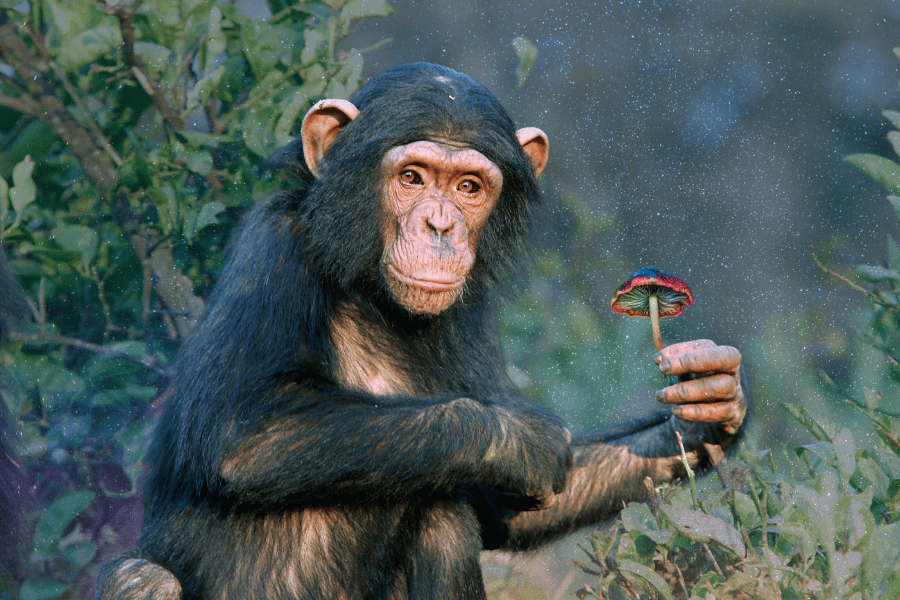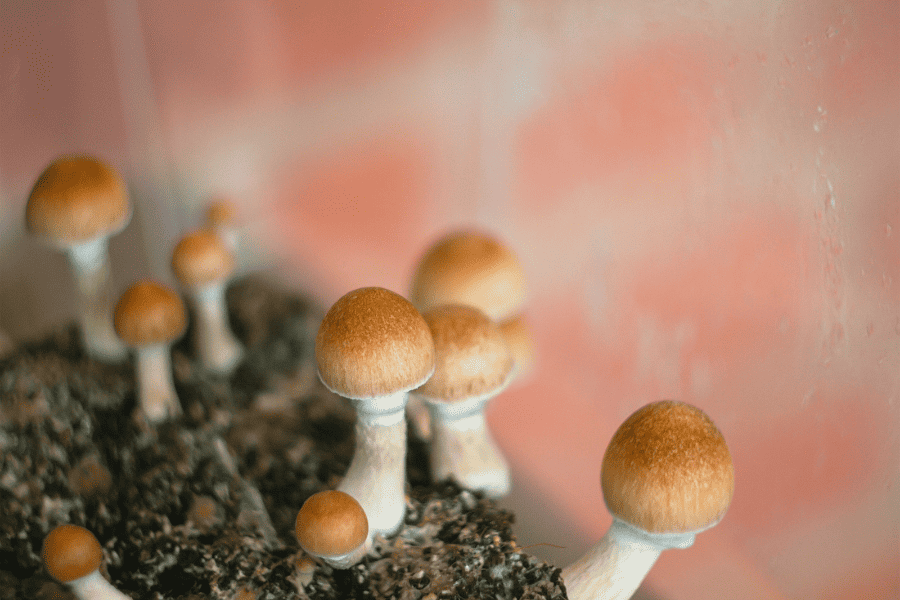Several theories attempt to explain this phenomenon, as well as the idea that the use of tools or the development of language contributed to our cognitive evolution. One of these theories suggests that psychedelics might have played an important role in our evolution. This hypothesis is known as the “Stoned Ape Theory.” It was proposed by infamous ethnobotanist and psychonaut Terence McKenna in the 1990s. The theory suggests that early humans used psychedelics, particularly psilocybin mushrooms, in African savannas around two million years ago, allowing them to develop advanced cognitive abilities, such as language and abstract thinking.
The theory is based on the idea that these ancestors began consuming psilocybin mushrooms growing on the dung of grazing animals, which contain the psychoactive compound psilocybin. This consumption would have had a profound effect on the brain, leading to increased neural plasticity and the development of new cognitive abilities.
What’s the Stoned Ape Theory Exactly?

Terence McKenna introduced the Stoned Ape Theory in his book “Food of The Gods” published in 1992. The theory suggests that one of our early ancestors, Homo Erectus, incorporated Psilocybe cubensis into their diet. The theory finds support in studies conducted by Roland L. Fischer in the 1960s and 70s on the effects of psychedelic mushrooms.
As Psilocybe cubensis frequently grows under cow feces, the theory posits that our ancestors followed herds, stumbled upon these mushrooms, and ate them as a light snack. This seemingly unimportant act could have had a profound impact on our ancestors’ brains, according to the theory. McKenna suggests that low doses of psilocybin, the active compound in the mushrooms, improved visual acuity, making our ancestors better hunters. Slightly higher doses acted as an aphrodisiac, leading to increased motivation to reproduce, and dissolved boundaries, promoting community bonding and group sexual activities.
Dennis McKenna, Terence McKenna’s brother, elaborates on the theory in the documentary Fantastic Fungi, stating that the mushrooms acted as software to program the neurologically modern hardware of our ancestors’ brains to think, have cognition, and use language. He notes that language is essentially synesthesia, an association between meaningless sounds and complex meanings.
Did our Ancestors Really Eat Mushrooms?
To determine if the Stoned Ape Theory has some solid ground we have to determine whether or not our ancestors consumed mushrooms. According to studies, 23 primate species have consumed mushrooms as part of their diet during centuries of evolution. Interestingly enough among these primates humans were also consuming mushrooms, which indicates that Terence McKenna was perhaps onto something. We know for a fact that ancient civilizations from Central America and Siberia have consumed magic mushrooms, giving them the name “food of the gods.”
After introducing the Stoned Ape Theory to the world, McKenna faced criticism from the scientific community. Many claimed that he misinterpreted previous findings, while others highlighted the theory’s lack of paleoanthropological evidence. Whatever the case, we know for a fact that humans have used magic mushrooms without a doubt, but could it be the reason for cognitive evolution? That’s something we just don’t know.
Criticisms of the Stoned Ape Theory
The Stoned Ape Theory has garnered significant attention as of late, yet remains a subject of intense debate and remains a controversial hypothesis. Critics argue that there is no strong evidence supporting the idea that psychedelics played a significant role in human evolution. They assert that the theory is built largely on speculation and that there is little empirical data to support its claims.
Others have proposed alternative theories of human evolution that focus on other factors, such as climate change or the development of tools and technology. These theories suggest that it was changes in the environment or advancements in human technology that drove our evolution, rather than the consumption of psychedelic mushrooms.
Stoned Ape Theory Backed Up by the Mycological Community

Mycologist Paul Stamets gave new life to the Stoned Ape Theory, presenting it as a viable explanation to a long-standing evolutionary puzzle during the Psychedelic Science conference. Like McKenna, Stamets believes that it’s highly plausible that early humans came across psilocybin while crossing savannahs that were undergoing desertification, where the psychedelic mushroom was growing abundantly in animal dung.
At the conference, Stamets confidently stated that there was a sudden doubling of the human brain 200,000 years ago, which is an extraordinary expansion from an evolutionary standpoint. He argued that there is currently no explanation for this sudden increase, making the Stoned Ape Theory worth considering. Furthermore, Stamets shared his perspective on the Stoned Ape Theory during an appearance on the Joe Rogan Podcast, leading to a wider audience considering the theory’s validity.
Final Word
In the quest to understand the origins of human consciousness, the Stoned Ape Theory has emerged as a fascinating hypothesis. While there is no concrete evidence that this theory is indeed correct, there are advocates of this hypothesis. Since the 1990s the Stoned Ape Theory has been criticized by the scientific community.
However, Despite all this criticism and debate, recent support from the mycological community, including renowned mycologist Paul Stamets, has given the theory new life. As we continue to explore the mysteries of human evolution, the Stoned Ape Theory remains a compelling possibility and a reminder that many unknowns still exist.





